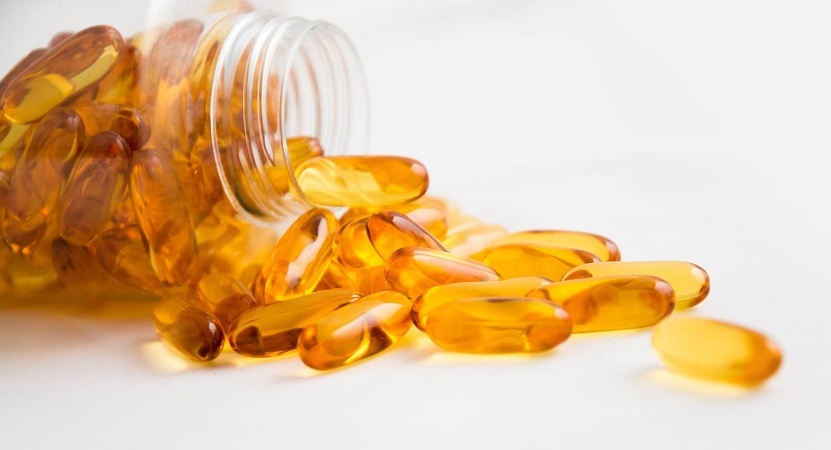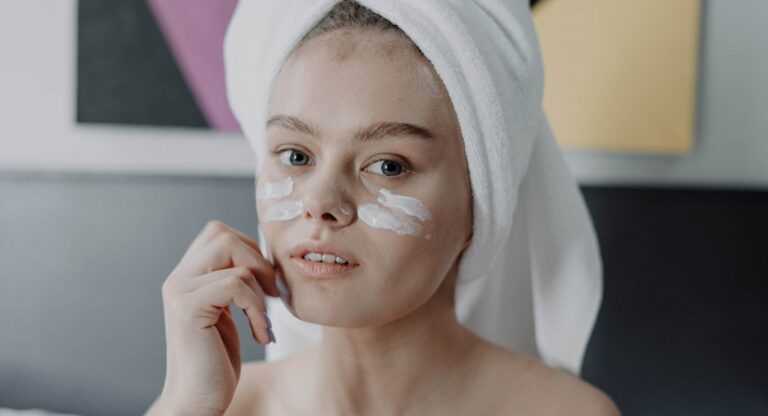Acne is the most common skin condition in the world, and yet it can make an individual feel like they stick out of a crowd like a sore thumb. There is an extremely psychological element to the effects of acne on a human being, and now more than ever the world is in dire need of natural treatment solutions. This is where supplements and vitamins for acne enter into the spotlight…
In this article we discuss the following:
Why are Vitamins Important if You Have Acne?
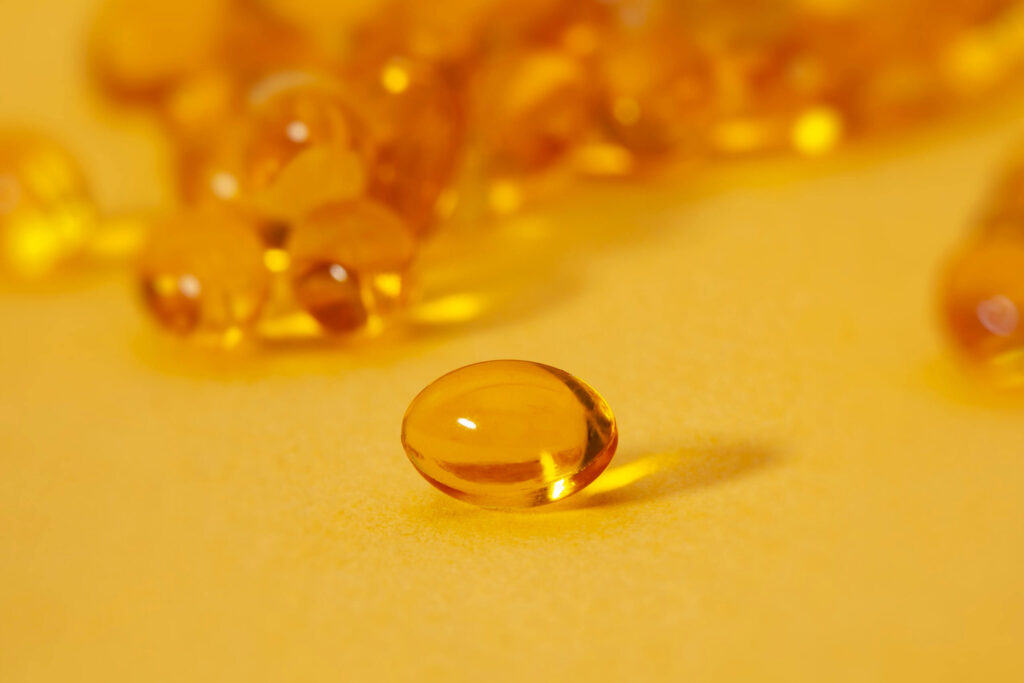
Acne was once a teenage problem: something to leave behind the same way you did high school, summer camps, and fake IDs.
It’s since crept back in on adults who probably assumed they were in the clear, particularly in women up until the age of 30 or more. For a long time acne was simply attributed to hormonal imbalance, which is surely still the case for some, but new studies are suggesting that acne is the result of a myriad of triggers, ranging from diet to genetics, and even stress.
“Your skin is a complex ecosystem involved in nearly every physiological process in the body, from gut health, to immune health, to mental health. Every case of acne is unique and related to underlying metabolic dysmetabolism. Excess oil production, hormonal dysregulation, fat deposition, and inflammation can all lead to the development of acne,” says Jessica Houston, Founder and CEO of the personalized vitamin company, Vitamin & Me.
Regardless of your unique triggers, acne is the result of unbalance in the body: either too much, or too little of certain toxins, oils, mucous, vitamins or minerals.
Incorporating oral vitamins and supplements into your daily life is one way of attempting to treat acne naturally. Acne supplements are a more gentle, safe approach to skin correction when compared to the harsh chemicals found in prescription medications including Accutane or Aczone. “Overall, lifestyle and diet are much bigger factors for acne than any supplement, but the right supplements can help get your skin glowing faster,” says Brittany Ford, RHN, from Biohacking Brittany.
Vitamins for acne will help to rebalance the essential nutrients that may be lacking in the body, which can cause outbreaks of whiteheads, blackheads, cysts, nodules or pimples.
“Acne be it mild or severe and is one of the most common skin issues affecting women as well as men. Depending upon the underlying cause, acne can be treated by using various medications, however, most prefer the use of natural remedies that are loaded with vitamins. Although acne is caused by either genetics, hormonal issues, skin type and diet, vitamins taken either orally or topically can be used to reduce acne and revitalize the skin,” according to Dr. Lina Velikova, MD, Ph.D., a medical advisor at Supplements101.
Can Some Vitamins Cause Acne?
Not all vitamins are able to coexist in harmony with the skin. Some have the opposite effect, and can actually trigger breakouts in certain individuals. There are a total of 13 essential vitamins within the nutrition spectrum, but only two pose notable risk to the condition of the skin: Vitamin D and Vitamin B12.
Does Vitamin D help acne? Sometimes, not always. People seek Vitamin D as a means of regulating the levels of calcium and phosphate within the body. These keep our bones, teeth and muscles healthy, and there is also a mood stabilizing effect associated with regular Vitamin D intake. You can get Vitamin D from certain foods, supplements, and from spending time in sunlight.
Many a Vitamin D acne study have shown certain forms of acne to become worsened due to low levels of Vitamin D. However, counter research has also shown that an excess of this vitamin almost always triggers hormonal acne in individuals who are prone to skin conditions, especially those who thought they had overcome or outgrown their acne stage of life. They can find themselves suffering all over again once excess Vitamin D is introduced.
Vitamin D naturally stimulates testosterone, and this is a major aggravator of hormonal acne, particularly in women. These vitamins are poorly regulated, and simply contain far too much of the compound than needed as a daily dosage. Your skin being the biggest organ in the body, takes on the responsibility of getting the excess nutrients out as quickly as possible.
The key with Vitamin D is balance. There is great potential in this nutrient as a treatment for acne when used in a suitable dosage, but great risk when used otherwise.
The next potentially problematic vitamin is that of B12. This is one of the most important nutrients for human beings, yet the majority are (unknowingly) existing in a B12 deficient state. Vitamin B12 is responsible for keeping our nerve and blood cells healthy. A lack of it can lead to a downward spiral into exhaustion, weakness and disease.
B12 is very hard for the human body to absorb; there have been many studies that suggest that all human beings should be taking B12 supplements, because we are no longer able to successfully absorb the nutrient from our foods. One common misconception is that a meat-eater diet gives the body all the B12 it needs. This is false, as it is not a form of B12 that actually resonates with our cellular structure, providing testament to why so many people exist in B12 deficiency without their knowledge.
Vitamin B12, when consumed in excess, will cause the bacteria in the skin to pump out inflammatory molecules that lead to breakouts.
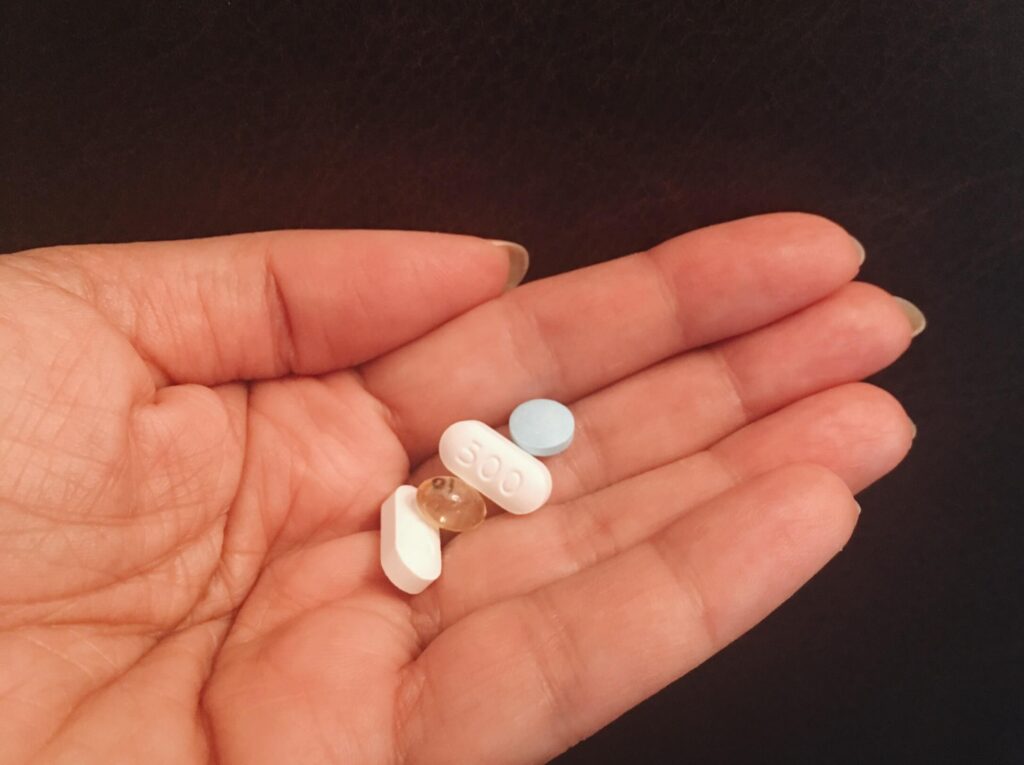
Best Vitamins for Acne
The aforementioned two vitamins aside, the rest of the essential nutrient spectrum contains some very beneficial vitamins for acne skin. Here follows everything you need to know about each one, and how they relate to helping problem skin.
Vitamin A for Acne
In the world of natural skincare, Vitamin A is often used as a potent compound for rapid cellular repair, particularly on the face and neck. Retinol is a topical derivative of Vitamin A, and can work to speed up the healing process of any active acne that may be present. A Vitamin A cream for acne is another form of topical access to the healing properties of this particular nutrient.
Inside of the body, Vitamin A is responsible for regulation of our immune systems, our vision and our reproductive abilities. A lot of our organs depend on Vitamin A for normal function.
Taking Vitamin A daily can, over time, work to even out conditions of the skin by reducing inflammation from the inside out. A healthy dose of Vitamin A will help keep skin cells from sticking together and in turn clogging pores. As with too much retinol, too much Vitamin A intake can lead to extreme dryness and flaking, as well as making the skin dangerously sensitive to the sun.
In many regards, topical Vitamin A for acne is definitely more effective at treating active breakouts than oral supplements of the vitamin. Getting it directly onto the skin means the rest of the body isn’t able to absorb it for other functions first.
Vitamin C for Acne
Vitamin C is one of the most important nutrients out of them all, and one of the best vitamins for skin. It is directly responsible for the growth, maintenance and repair of all bodily tissues, so that we can stay alive. It’s quite remarkable how many essential functions are dependent on Vitamin C. These include wound healing, our abilities to absorb iron, growth of cartilage, formation of collagen and development of the immune system (to name a few).
Does Vitamin C help acne? Vitamin C is an antioxidant compound that works to restrict the movement of free radical oxygen molecules. In this way, overproduction of oils and clogged pores are prevented, which gives active acne a chance to breathe (and heal).
Vitamin C and acne go hand in hand, as the nutrient will also promote collagen production in the problem areas, which in turn reduces the skin’s ability to scar. This is the amongst the best vitamins for acne scars as your spots can heal free of the temptation to leave a trace behind. Anyone who has dealt with acne scarring will tell you that this is a tremendous benefit.
Jack Anderson, founder of Sport Fitness Advisor, notes that, “The antioxidant powers of vitamin C will shield your skin from the sun, and reduce the appearance of wrinkles. Consistent application of a vitamin C serum will brighten skin, even out your skin tone and shrink your pores. The extra collagen production makes your face more firm and youthful looking.”
Can Vitamin C Cause Acne?
Many are quick to ask: does Vitamin C help with acne? But few take the time to explore the ways in which Vitamin C can actually cause certain forms of acne.
There still needs to be extensive research conducted on this matter. There are some individuals who report seeing a decline in the condition of their skin after introducing more Vitamin C into their daily regime.
Sometimes when a nutrient is too potent for a certain type of skin (such as extremely sensitive skin), it can cause adverse reactions to take place, almost as though the skin were entering into a ‘panic’ state.
Itchiness and consequential breakouts are possible with the absorption of too much Vitamin C, and in worst case scenarios some people have experienced what is known as ‘purging’. Skin purging is the process of active ingredients increasing the skin cell turnover rate. It can look like dozens of red bumps on the skin, and eventually quite severe flaking, blackheads and/or whiteheads.
So with all things considered, is Vitamin C good for acne? We still stand by it as being one of the best clear skin vitamins when used correctly. Everything in moderation, right?
Vitamin E for Acne
Vitamin E and acne is another complex partnership. In fact, Vitamin E and Vitamin C work in a very similar way when it comes to the skin.
Vitamin E is also an antioxidant, so it too works to reduce the levels of free radical molecules moving between the skin cells. Vitamin E has been shown to be particularly instrumental in healing damage caused by the sun. This is not limited to facial damage, which is why a lot of body lotions contain Vitamin E as an active ingredient.
What’s interesting is that ingested Vitamin E (the type found inside of the body) is associated with skin health throughout the body. It is a natural anti-inflammatory, which can help reduce the skin’s susceptibility to break out in pimples, whiteheads, cysts and others.
Vitamin B5 for Acne
Under the bracket of B vitamins, there are a total of eight essentials. One of these is Vitamin B5, which is also known as pantothenic acid.
B vitamins are directly responsible for the production of energy in the body. They work to transform our foods into fuel, so that we can get through daily life without keeling over. Vitamin B5 in particular works closely with the adrenal glands, assisting them with proper function and filtration. Healthy digestion is also associated with B5.
In terms of Vitamin B5 benefits for skin, this nutrient has been shown in various studies to drastically improve the appearance of acne in an average of 12 weeks of regular consumption. Vitamin B5 for skin is therefore comparable in effect to Accutane, as it actually works from as early on as the formation stage of acne. Perhaps then this is one of the most impressive vitamins for acne prone skin as none of the others have been shown to have this ability as far as studies can tell.
This nutrient is available to us in certain foods, but you’d have to eat an unreasonable amount of each in order to receive any of the noteworthy Vitamin B5 benefits for skin. For this reason, a daily supplement is recommended.
Pantothenic Acid Side Effects
There are some Vitamin B5 side effects that you need to know about. Taking pantothenic acid for acne may cause some unwanted experiences inside of the body, simply as a result of the potency of this compound.
Common occurrences include muscular and joint pains, as well as noticeable weakness in the body. This can lead to dizziness over time.
Some people report milder symptoms such as headaches or sore throats. Those with the most discomfort reported problems in the digestive system, including diarrhea, cramping and/or constipation.
In rare instances there is reason to suggest that the consumption of too much pantothenic acid caused the onset of diabetes mellitus in some individuals. Jaundice and pancreatitis are two more less common side effects of B5.
All of the listed side effects are alarming to anyone who is newly embarking on an acne treatment journey. Since B5 is being repeatedly likened to Accutane in effectiveness, there is a large community of individuals who argue that all of the aforementioned side effects pale in comparison to the negative effects that Accutane has on the human body. They feel B5 is a walk in the park and a far more gentle solution, considering that Accutane can actually cause seizures, strokes and even rectal bleeding.
Vitamin B5 Acne Dosage
Keeping the B5 risks and side effects in mind, it becomes increasingly important to adopt a safe, calculated dosage for the intake of this vitamin when intending to use it to treat active acne.
In 1997 it became accepted that acne patients should receive between 5-10 grams as pantothenic acid acne dosage per day. The exact dosage should be prescribed depending on the severity of the acne in question, as well as the general sensitivity of the individual.
There have since been modified recommendations for a suitable Vitamin B5 dose for acne. Pantothenic acid is widely administered alongside L-Carnitine, which is an amino acid that helps the body absorb the effects of the B5 itself.
It is thought that exceeding 10 grams of Vitamin B5 per day puts the individual at risk of the listed side effects. Keeping below this dosage makes them low risk. Exceeding this amount can also interfere with the balance of other B vitamins within the body, so it’s precarious territory that needs to be treaded thoughtfully.
Always consult with a healthcare practitioner or skin specialist before self-prescribing pantothenic acid as a treatment for severe acne.
Vitamin B3 for Skin
This vitamin is often referred to as niacinamide or nicotinamide. B3 are vitamins that help with acne by reducing the production of facial sebum.
We all need and produce sebum; it’s a natural moisturizer for the skin at large. It’s an oily, wax-like substance that is most prominent on the face and scalp. Some people, however, experience overproduction of sebum and, as a result, the pores become lodged with the wax and unable to clean themselves. This is when breakouts occur.
If you’d classify your skin as naturally oily, then you’re likely suffering from too much sebum production. Your problem skin may be a direct result of this imbalance, and can be greatly improved through the use of specific vitamins good for acne, such as B3.
What’s interesting to note is that sebum production is almost always under control of the androgens, or sex hormones. A hormonal imbalance will directly affect your sebum production, sometimes making too much, and sometimes not enough. There are many vitamins for hormonal acne, but none that we feel have as direct an impact on the facial zone as Vitamin B3.
B3 is one of the best vitamins for hormonal acne as it is directly concerned with sebum, and not just hormones in general. An example of the latter is Vitamin D, which only affects the sex hormone testosterone and thus actually causes acne, as opposed to reducing it.
5 Top Supplements for Acne
Acne supplements include vitamins, minerals and other essential nutrients that are crucial to the successful functioning of the human body. There are many different ways to receive nutritional supplements; it really depends on how much of a particular nutrient you need, and what your lifestyle allows for in terms of implementation.
Supplements can be taken in the form of capsules, powders and even water-soluble compounds such as teas. As we’ve discussed, vitamins and supplements are intended to create a balance somewhere in the body where it is lacking, in hopes of offering the opportunity for healing of particular ailments including problem skin.
The following forms of acne supplements are the ones you need to know about:
Supplements for Hormonal Acne
There is a major problem, seemingly worldwide, of doctors prescribing oral contraceptives to women who are seeking help with hormonal acne that is plaguing their lives. It’s been the easy, go-to for years, with little to no consideration given to the negative long term effects that these daily chemicals have on the female body.
If a doctor attempts to tell you that contraceptives are your only hope for getting your acne under control — run!
There is hope yet; many nutritional supplements are making great strides in correcting hormonal imbalance naturally, allowing for problem skin to be brought under control in the process.
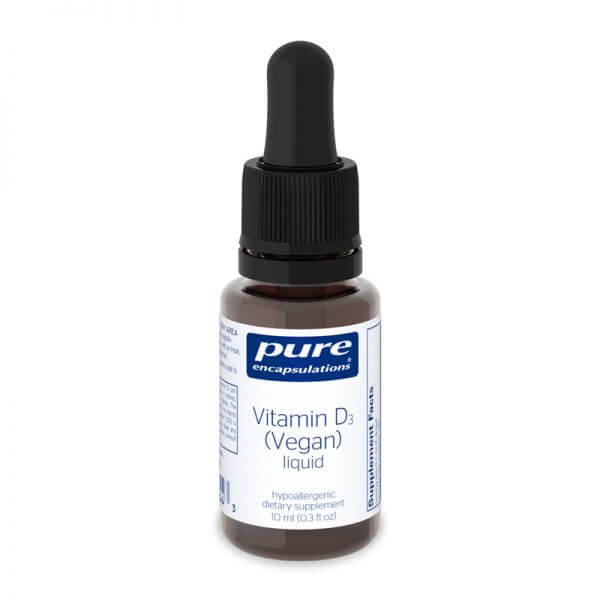
Pure Encapsulations Vitamin D3 (Vegan) Liquid 10 ml
This cruelty free Vitamin D supplement comes in drop form and is a gentle way of receiving a safe dose of this nutrient daily. This specific form of Vitamin D3 is derived from mushrooms, and works in the blood to lift the levels of Vitamin D naturally, and mildly.
We know there are risks associated with excess intake of Vitamin D, especially when it comes to triggering acne. This supplement instead works to support and regulate the breast, prostate, bone and cardiovascular health systems so that your hormones aren’t under constant strain.
Supplements for Cystic Acne
Zinc is one of the most effective supplements for improving the condition of the skin. This is an essential nutrient throughout the human body, but its main function is that of cellular growth, division and healing.
Zinc as both an oral or topical treatment has been shown to be an ally against even the most severe acne, but too much of this mineral will lead to flakey skin as it totally eradicates oil production in the face.
Cystic acne occurs when the pores become totally clogged with oil and dead skin cells, and they form pockets of bacterial infection that just can’t seem to find relief. There is usually a lot of pus and secretion involved in cystic acne.
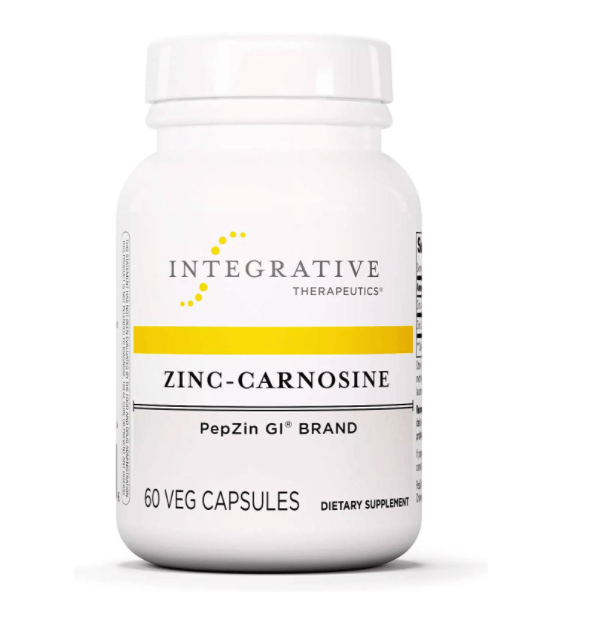
Integrative Therapeutics Zinc-Carnosine
This is one of the better quality zinc supplements on the market. At a dosage of just 200mg per day, you’re likely to see a radical improvement in the condition of your cystic acne in just over a month.
If you start to experience any diarrhea or nausea as a result of taking this supplement, consider lowering your dosage. We’d recommend always taking this after a meal has been eaten.
The Integrative Therapeutics zinc supplement targets the acne-forming bacteria that becomes lodged in cystic nodules, therefore easily reducing the visible signs of this kind of acne in a relatively short period of time.
Vitamin A Supplement for Acne
We took a close look at the effects of Vitamin A on acne earlier in this piece. The body is extremely dependent on Vitamin A at large, so we find that orally administered supplements tend to be distributed to inner zones of the body before they make their way to the skin.
This is why topical supplements of Vitamin A have become so popular, particularly within the realm of natural skincare.
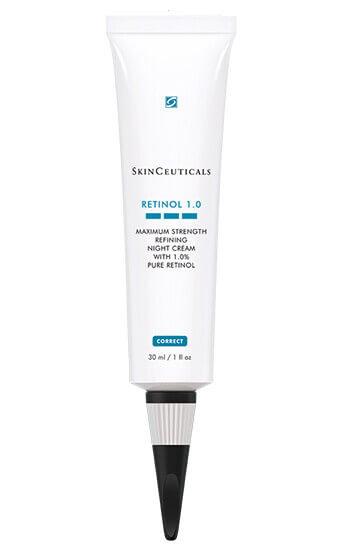
Skin Ceuticals Retinol 1
If there’s one brand we trust with acne, it’s Skin Ceuticals. They have been the market leaders in treatments for problem skin for decades, with many of their products retailing at well above the average price due to sheer effectiveness and quality.
Their retinol 1% is a potent Vitamin A cream for acne, and works topically to deliver the healing properties of the nutrient directly onto the inflamed skin. While this is a direct and effective approach, retinol should always be used with caution.
Retinol makes the skin very sensitive to the sun, so it should only ever be used at night. Wash it off in the morning before leaving the house, and never forget to apply sunblock prior to doing so.
Vitamin E Supplement for Acne
Vitamin E is another acne-friendly vitamin that we explored at length. It plays an integral part in maintaining the health of all skin, not just that of the face.
Vitamin E takes an antioxidant approach to skin healing, so taking it orally or using it topically have largely the same effect at the end of the day.
Murad Pure Skin Clarifying Dietary Supplement
This supplement by Murad provides an internal defense against breakouts associated with low levels of Vitamin E.
Vitamin E deficiency is not usually linked to more severe forms of acne, rather mild to moderate signs of inflammation and build up, such as blackheads. As a supplement, this will send antioxidants throughout the immune system, in turn protecting the skin from free radicals that seek to amplify irritation.
If clearer, healthier looking skin is your goal, Murad can help you achieve that natural glow factor.
Best Multivitamin for Acne
If you’re at a bit of a loss as to what vitamins and minerals you are lacking that are contributing to your problem skin, then you’re not alone.
Many people resonate with more than one vitamin deficiency, making it hard to settle on a single supplement as a means of treatment. In these instances, a daily multivitamin is recommended as it will contain the necessary dosages of each essential nutrient your body needs, thus working on multiple levels of deficiency at once.
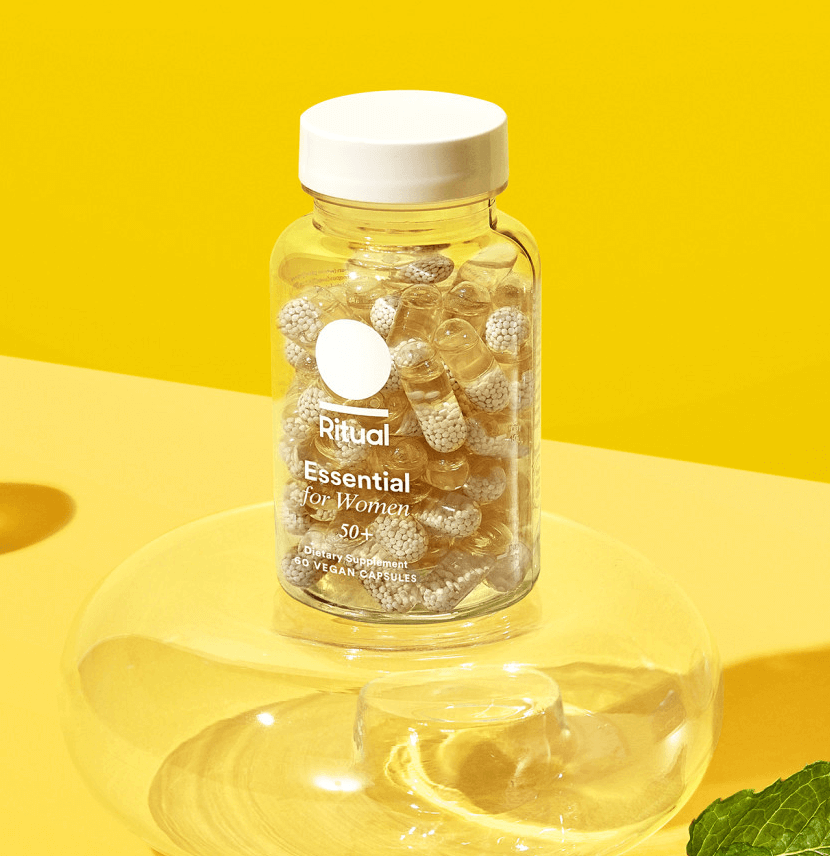
Ritual Essential Multivitamin
We’d argue that no brand understands multivitamins quite like Ritual. Their range is specifically formulated for both men and women, delivering the different nutrients necessary for both body-types.
Once you’ve selected the multivitamin that is best for you, Ritual works as a subscription service. Your multivitamins will arrive at your front door once a month, ready to carry you through with all your nutrient needs.
We love the concept, and the vitamins are high quality, non-GMO and vegan friendly. This is a great way to facilitate the healing of your acne, as well as support the rest of your bodily functions in the process.
Did You Enjoy This Article?
If you enjoyed this article, you might also like our articles discussing acne such as Best Face Wash for Acne, Acne Patch for Pimples, Microneedling, and Essential Oils for Skin.

